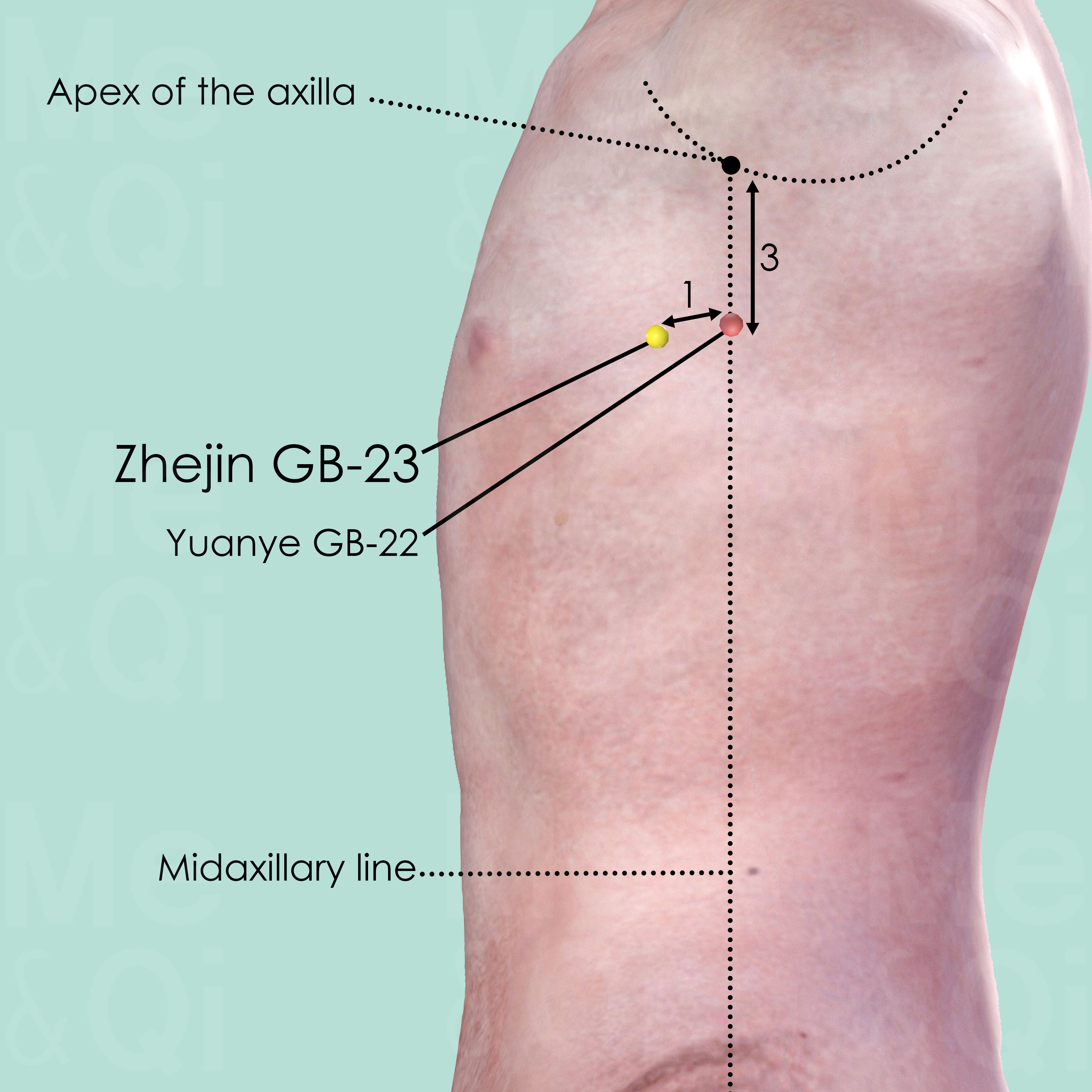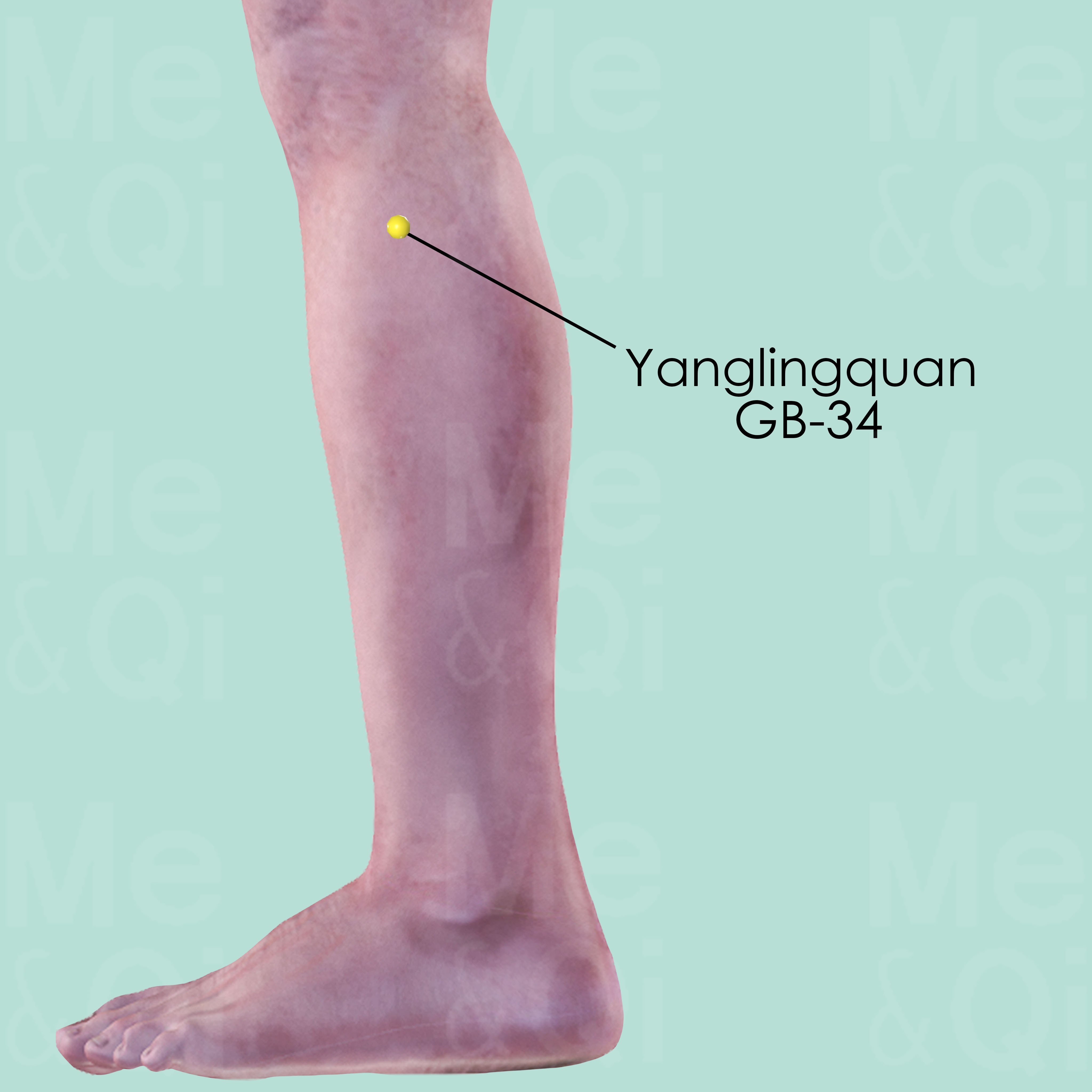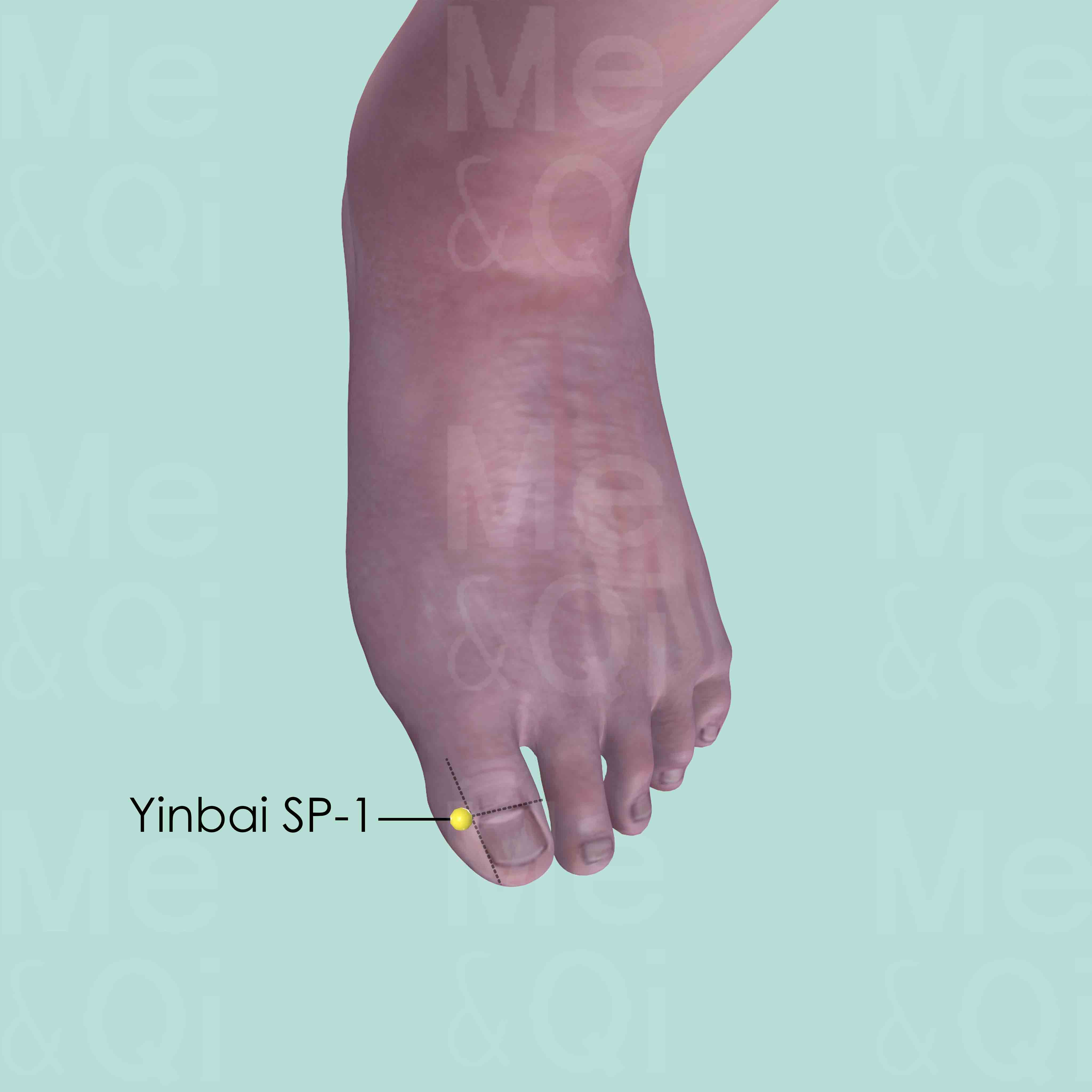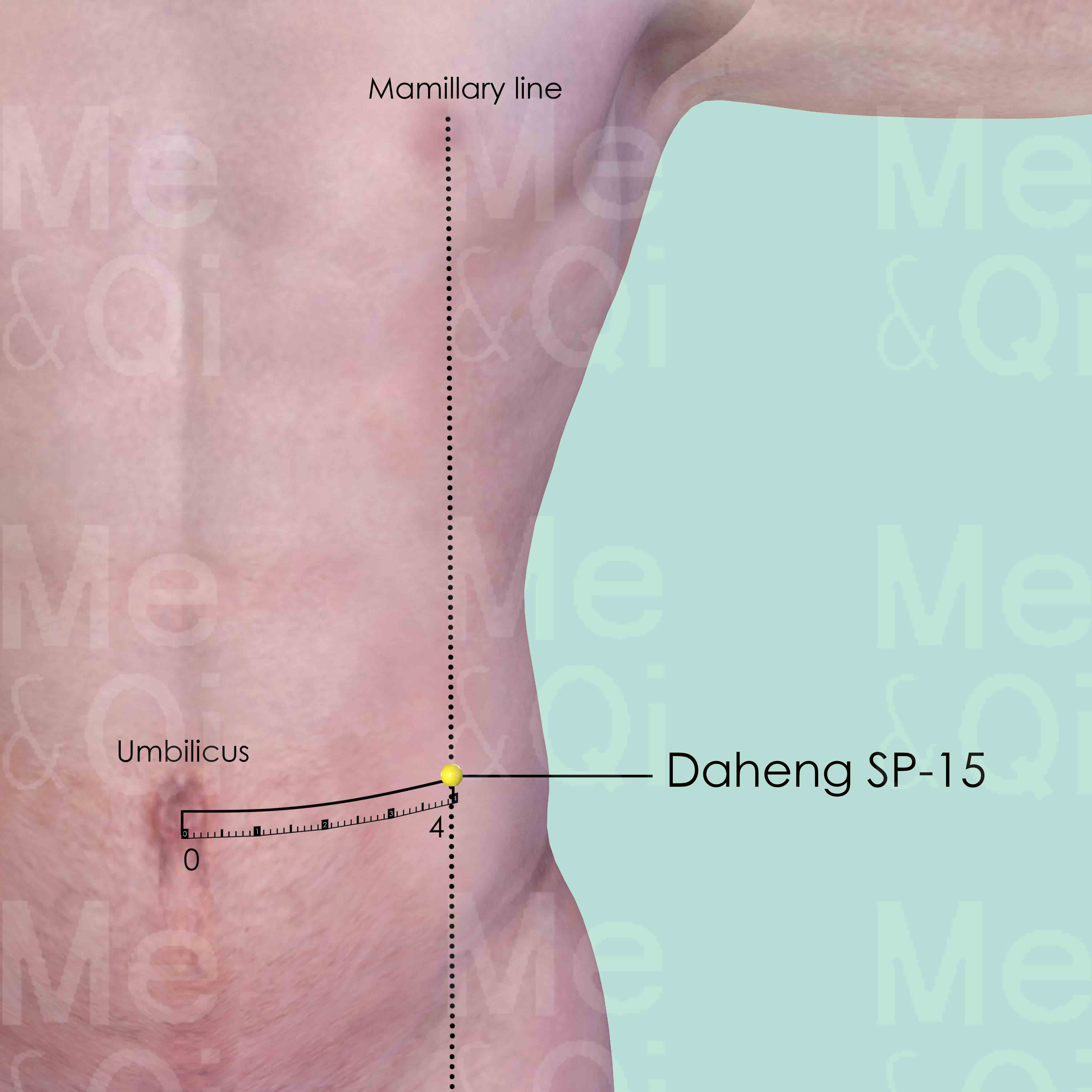Sighingaccording to TCM
Symptom family: Breathing Patterns
What is Sighing?
Sighing is a deep and prolonged inhalation followed by a slower exhalation, often involuntary and sometimes accompanied by sound. It's a common physical response to stress, fatigue, or frustration, serving as a natural regulator of emotional and physiological states.
While occasional sighing is normal and can even be a healthy way to express emotions or reset breathing patterns, frequent or excessive sighing might indicate underlying health concerns, ranging from anxiety and stress to more complex respiratory conditions.
How does TCM view Sighing?
Traditional Chinese Medicine (TCM) interprets sighing as an indication of Qi (vital energy) stagnation, particularly involving the Liver and Heart. TCM posits that emotional upheaval, stress, or internal disharmony can disrupt the smooth flow of Qi, leading to its stagnation and resulting in frequent sighing.
This perspective underscores the interconnectedness of physical, emotional, and energetic health in TCM, highlighting the importance of identifying and addressing the root cause of Qi Stagnation to alleviate symptoms like sighing.
Root Causes of Sighing in TCM
TCM identifies Qi Stagnation as a primary cause of sighing, especially when linked to emotional stress or internal imbalance. Heart Qi Stagnation and Liver Qi Stagnation are two patterns commonly associated with this symptom. Heart Qi Stagnation can manifest as frequent sighing accompanied by palpitations and a feeling of oppression in the chest, reflecting emotional distress impacting the Heart's ability to circulate Qi effectively.
Liver Qi Stagnation, on the other hand, might present with hypochondriac distension and mood swings, indicating that constrained emotions are impeding the liver's role in ensuring the smooth flow of Qi and Blood. Addressing these patterns involves both alleviating the immediate symptom and restoring overall harmony to the body's Qi dynamics.
Explore below more details about what might cause Sighing according to TCM.
- By Syndrome
- By Organ
- Qi Stagnation
- Qi Deficiency
- Qi Rebellion
- Yin Deficiency
- Blood Stasis
- Heat
- Dampness
- View More Causes
- Liver
- Heart
- Lung
- Gallbladder
- Pericardium
- Stomach
- View More Organs
Qi Stagnation
Qi Stagnation in TCM is like having a traffic jam in your body's energy system. Qi, the vital life force that flows through your body, is supposed to move smoothly to maintain health and balance. But with Qi Stagnation, this flow gets blocked or slowed down, like cars stuck on a highway. This can lead to symptoms like feeling stressed, emotional mood swings, and physical discomfort, often described as a feeling of fullness or tightness, especially in the chest or abdomen. It's as though the body's internal energy circulation is disrupted, causing various issues. TCM sees this as an energy flow problem, different from modern medicine's focus on specific physiological processes.... see more
Qi Stagnation Patterns That Can Lead to Sighing
Common Symptoms: Depression Lack Of Appetite Chest Distension Throat Lumps Irritability Palpitations Feeling Of Oppression Of The Chest Shortness Of Breath
| Pattern Name | Relevant Symptoms | Relevant Formulas |
|---|---|---|
| Heart Qi Stagnation | Frequent sighing, Palpitations, Chest distension, Feeling of oppression of the chest, Depression | Ban Xia Hou Pu Tang |
| Liver Qi Stagnation | Frequent sighing, Sighing, Hypochondriac distention, Chest distension, Upper abdominal distension, Abdominal distention, Melancholia, Depression, Mood swings, Irregular periods, Globus sensation, Pre menstrual breast distension, Pre menstrual tension, Anxiety, Anger... see more | Chai Hu Shu Gan San | Xiao Yao San | Wu Yao Tang | Jia Wei Xiao Yao San | Yue Ju Wan | Yi Guan Jian |
| Pericardium Qi Stagnation | Frequent sighing, Mild chest pain, Chest distension, Stifling sensation in the chest, Sighing, Throat lumps, Palpitations, Depression, Irritability, Lack of appetite, Weak limbs, Cold extremities... see more | Ban Xia Hou Pu Tang |
| Qi Stagnation | Frequent sighing, General fullness, Moving pain, Depression, Irritability, Mood swings, Sighing | Chai Hu Shu Gan San | Xiao Yao San | Si Mo Tang | Qi Ge San |
Qi Deficiency
Qi Deficiency in TCM is like running low on battery power. Qi is the vital energy that powers every function in your body. When there's a Qi Deficiency, it means your body doesn't have enough of this essential energy. This can make you feel tired all the time, weak, or even cause shortness of breath. It's similar to how you feel when you haven't had enough sleep or nutritious food. Your body just doesn't have the energy it needs to perform at its best. Unlike modern medicine, which often focuses on specific physical causes for fatigue and weakness, TCM views Qi Deficiency as an overall energy depletion that affects your entire well-being, and it seeks to replenish and balance this vital energy.... see more
Qi Deficiency Patterns That Can Lead to Sighing
Common Symptoms: Timidity Easily Startled Lack Of Bravery Indecision Dizziness Blurry Vision Eye Floaters Nervousness
| Pattern Name | Relevant Symptoms | Relevant Formulas |
|---|---|---|
| Gallbladder Deficiency | Frequent sighing, Timidity, Easily startled, Lack of bravery, Indecision, Sighing, Dizziness, Blurry vision, Eye floaters, Nervousness, Early awakening, Vivid dreaming... see more | Wen Dan Tang |
| Liver Qi Deficiency | Frequent sighing, Dizziness, Blurry vision, Eye floaters, Nervousness, Timidity, Easily startled, Lack of bravery, Indecision, Sighing, Vivid dreaming, Depression, Irritability, Hypochondriac distention, Irregular periods, Lack of appetite, Generalized fatigue, Abdominal distention... see more | Xiao Yao San | Bu Zhong Yi Qi Tang | Si Wu Tang |
| Lung and Heart Qi Deficiency | Frequent sighing, Shortness of breath, Coughing, Weak voice, Reluctance to speak, Pale face, Frequent colds or flu, Generalized fatigue, Palpitations, Depression, Spontaneous sweat, Sighing... see more | Si Jun Zi Tang | Bao Yuan Tang |
Qi Rebellion
Rebellious Qi in TCM is a bit like having a rebel inside your body. Qi, which is the vital energy flowing through your body, is supposed to move in certain directions to keep everything in balance and working well. But with Rebellious Qi, this energy decides to go the opposite way. Think of it like a river flowing upstream instead of downstream. This can cause various issues like heartburn, coughing, or even headaches. It's as if the body's natural flow is disrupted, creating a kind of internal chaos. TCM focuses on correcting this flow, restoring order and balance.... see more
Qi Rebellion Patterns That Can Lead to Sighing
Common Symptoms: Hypochondriac Distention Upper Abdominal Distension Hiccups Nausea Or Vomiting Belching Irritability Stomach Churning Breast Engorgement
| Pattern Name | Relevant Symptoms | Relevant Formulas |
|---|---|---|
| Rebellious Liver Qi | Frequent sighing, Hypochondriac distention, Upper abdominal distension, Hiccups, Sighing, Nausea or vomiting, Belching, Stomach churning, Irritability, Breast engorgement, Headaches, Dizziness... see more | Chai Hu Shu Gan San | Si Ni San |
| Rebellious Liver Qi invading the Stomach | Frequent sighing, Irritability, Upper abdominal pain, Upper abdominal distension, Hypochondriac pain, Hypochondriac distention, Upper abdominal oppression, Acid reflux, Hiccups, Belching, Nausea or vomiting, Sighing, Weak limbs... see more | Ban Xia Hou Pu Tang | Si Mo Tang | Xuan Fu Dai Zhe Tang | Ju Pi Zhu Ru Tang | Ding Xiang Shi Di Tang |
Yin Deficiency
Yin deficiency in TCM is a pattern of disharmony characterized by a depletion of the body's Yin energy, which represents the cooling, moistening, and nurturing aspects of our physiology. This condition often arises from factors like chronic stress, overwork, insufficient rest, or prolonged illness. Symptoms of Yin deficiency can include a sensation of heat, especially in the afternoon or evening, night sweats, insomnia, a dry mouth or throat, and a red tongue with little coating. There might also be a general feeling of restlessness or irritability. Since Yin is essential for balancing the body's active and warm Yang energy, its deficiency leads to a relative excess of Yang, manifesting as heat or dryness symptoms.... see more
Yin Deficiency Patterns That Can Lead to Sighing
| Pattern Name | Relevant Symptoms | Relevant Formulas |
|---|---|---|
| Lung Yin Deficiency | Frequent sighing, Hoarse voice, Itchy throat, Reluctance to speak, Thin chest | Bai He Gu Jin Tang |
Blood Stasis
Blood Stasis in TCM is a concept where the blood flow in the body is not as smooth or efficient as it should be. Imagine a river that's supposed to flow freely, but instead, it's getting blocked or moving too slowly in some parts. This can lead to various health issues, like pain that feels sharp or stabbing, dark bruises, and a complexion that looks purplish. TCM believes that good health relies on the smooth and vibrant flow of Qi and blood throughout the body, so when blood gets stuck, it's like a traffic jam in your body, leading to discomfort or health problems.... see more
Blood Stasis Patterns That Can Lead to Sighing
| Pattern Name | Relevant Symptoms | Relevant Formulas |
|---|---|---|
| Heart Vessel obstructed | Frequent sighing, Palpitations, Shortness of breath, Depression, Restlessness, Feeling of oppression of the chest, Heart pain, Chest pain, Sputum, Feeling of heaviness, Reluctance to speak, Cold extremities, Sighing, Purple lips, Purple nails, Purple face... see more | Xue Fu Zhu Yu Tang | Chai Hu Shu Gan San | Di Tan Tang | Dang Gui Si Ni Tang |
Heat
In TCM "Heat" signifies an excess of Yang energy, leading to an imbalance where heat predominates over the body's cool Yin aspects. This condition is metaphorically akin to an internal over-heating. Symptoms indicative of Heat can include feelings of warmth, fever, sweating, irritability, red face, thirst with a preference for cold drinks, and a rapid pulse. The tongue may appear red with a yellow coating. Unlike the common interpretation of heat in terms of temperature, in TCM, it represents a state of hyperactivity or inflammation in the body.... see more
Heat Patterns That Can Lead to Sighing
| Pattern Name | Relevant Symptoms | Relevant Formulas |
|---|---|---|
| Damp-Heat | Frequent sighing, Fever, Neck gland swelling, Headaches, Tight feeling in chest and stomach, Sticky taste in the mouth, Absence of thirst, Feeling hot, Feeling of heaviness, Bitter taste in the mouth, Acne... see more | Long Dan Xie Gan Tang | Yi Huang Tang |
Dampness
"Dampness" in TCM is a concept that describes a pattern of disharmony where the body accumulates excess moisture. Imagine the heavy, sticky feeling you get on a very humid day; that's similar to what dampness feels like internally. It can manifest as a sense of heaviness, bloating, sluggishness, or even a foggy mind. This condition is often thought to arise from environmental factors like living in a damp place, dietary habits that promote moisture in the body, or internal imbalances that hinder the body's ability to process fluids properly. In TCM, dampness can obstruct the normal flow of energy and fluids in the body, leading to various symptoms.... see more
Dampness Patterns That Can Lead to Sighing
| Pattern Name | Relevant Symptoms | Relevant Formulas |
|---|---|---|
| Damp-Heat | Frequent sighing, Fever, Neck gland swelling, Headaches, Tight feeling in chest and stomach, Sticky taste in the mouth, Absence of thirst, Feeling hot, Feeling of heaviness, Bitter taste in the mouth, Acne... see more | Long Dan Xie Gan Tang | Yi Huang Tang |
Liver
In TCM the Liver is viewed as the organ responsible for the smooth flow of Qi, Blood, and emotions throughout the body. It plays a key role in regulating mood, storing blood, supporting digestion, and ensuring the health of tendons and eyes. When the Liver malfunctions or is imbalanced in TCM, it can lead to a range of issues such as irritability, mood swings, menstrual irregularities, eye problems, and muscular stiffness or pain. A malfunctioning Liver in TCM reflects not only physical disturbances but also emotional and mental disharmony, emphasizing the holistic approach of TCM in addressing health and wellness.... see more
Liver Patterns That Can Lead to Sighing
Common Symptoms: Hypochondriac Distention Irritability Upper Abdominal Distension Hiccups Belching Abdominal Distention Depression Irregular Periods
| Pattern Name | Relevant Symptoms | Relevant Formulas |
|---|---|---|
| Liver Qi Stagnation | Frequent sighing, Sighing, Hypochondriac distention, Chest distension, Upper abdominal distension, Abdominal distention, Melancholia, Depression, Mood swings, Irregular periods, Globus sensation, Pre menstrual breast distension, Pre menstrual tension, Anxiety, Anger... see more | Chai Hu Shu Gan San | Xiao Yao San | Wu Yao Tang | Jia Wei Xiao Yao San | Yue Ju Wan | Yi Guan Jian |
| Liver Qi Deficiency | Frequent sighing, Dizziness, Blurry vision, Eye floaters, Nervousness, Timidity, Easily startled, Lack of bravery, Indecision, Sighing, Vivid dreaming, Depression, Irritability, Hypochondriac distention, Irregular periods, Lack of appetite, Generalized fatigue, Abdominal distention... see more | Xiao Yao San | Bu Zhong Yi Qi Tang | Si Wu Tang |
| Rebellious Liver Qi | Frequent sighing, Hypochondriac distention, Upper abdominal distension, Hiccups, Sighing, Nausea or vomiting, Belching, Stomach churning, Irritability, Breast engorgement, Headaches, Dizziness... see more | Chai Hu Shu Gan San | Si Ni San |
| Rebellious Liver Qi invading the Stomach | Frequent sighing, Irritability, Upper abdominal pain, Upper abdominal distension, Hypochondriac pain, Hypochondriac distention, Upper abdominal oppression, Acid reflux, Hiccups, Belching, Nausea or vomiting, Sighing, Weak limbs... see more | Ban Xia Hou Pu Tang | Si Mo Tang | Xuan Fu Dai Zhe Tang | Ju Pi Zhu Ru Tang | Ding Xiang Shi Di Tang |
Heart
In TCM the Heart is considered the "emperor" of all organs, primarily responsible for governing Blood and housing the mind, known as "Shen." It plays a crucial role in maintaining mental-emotional equilibrium and controlling the circulation of Qi and blood throughout the body. When the Heart is imbalanced or malfunctions in TCM, it can lead to a range of issues like heart palpitations, insomnia, dream-disturbed sleep, anxiety, and a flushed complexion. Emotional disturbances such as excessive joy or lack of joy are also seen as signs of Heart disharmony. These symptoms reflect not just physical heart conditions but also the state of one's Shen, indicating the interconnectedness of physical and emotional well-being in TCM.... see more
Heart Patterns That Can Lead to Sighing
Common Symptoms: Palpitations Depression Shortness Of Breath Feeling Of Oppression Of The Chest Cold Extremities Purple Lips Pale Face Reluctance To Speak
| Pattern Name | Relevant Symptoms | Relevant Formulas |
|---|---|---|
| Heart Qi Stagnation | Frequent sighing, Palpitations, Chest distension, Feeling of oppression of the chest, Depression | Ban Xia Hou Pu Tang |
| Heart Vessel obstructed | Frequent sighing, Palpitations, Shortness of breath, Depression, Restlessness, Feeling of oppression of the chest, Heart pain, Chest pain, Sputum, Feeling of heaviness, Reluctance to speak, Cold extremities, Sighing, Purple lips, Purple nails, Purple face... see more | Xue Fu Zhu Yu Tang | Chai Hu Shu Gan San | Di Tan Tang | Dang Gui Si Ni Tang |
| Lung and Heart Qi Deficiency | Frequent sighing, Shortness of breath, Coughing, Weak voice, Reluctance to speak, Pale face, Frequent colds or flu, Generalized fatigue, Palpitations, Depression, Spontaneous sweat, Sighing... see more | Si Jun Zi Tang | Bao Yuan Tang |
Lung
In TCM the Lungs are seen as the organ responsible for controlling Qi and respiration, as well as being a key part of the body's defensive system. They are thought to maintain the balance and flow of air and moisture, and are closely linked to the skin and hair. When the Lungs are imbalanced or malfunctioning in TCM, it can lead to respiratory issues like coughing or asthma, a weakened immune system, dry skin, and emotional disturbances such as sadness or grief. These symptoms are believed to arise from disruptions in the Lungs' ability to regulate Qi and protect the body, highlighting their central role in maintaining overall health and well-being.... see more
Lung Patterns That Can Lead to Sighing
Common Symptoms: Reluctance To Speak Weak Voice Generalized Fatigue Shortness Of Breath Depression Hoarse Voice Itchy Throat Thin Chest
| Pattern Name | Relevant Symptoms | Relevant Formulas |
|---|---|---|
| Lung Yin Deficiency | Frequent sighing, Hoarse voice, Itchy throat, Reluctance to speak, Thin chest | Bai He Gu Jin Tang |
| Lung and Heart Qi Deficiency | Frequent sighing, Shortness of breath, Coughing, Weak voice, Reluctance to speak, Pale face, Frequent colds or flu, Generalized fatigue, Palpitations, Depression, Spontaneous sweat, Sighing... see more | Si Jun Zi Tang | Bao Yuan Tang |
Gallbladder
In TCM the Gallbladder has a unique role in storing and excreting bile, but more importantly, it's seen as crucial for decision-making and courage. It's closely connected to the Liver, assisting in the smooth flow of Qi (vital energy) and supporting the Liver's role in maintaining emotional balance. When the Gallbladder malfunctions or is imbalanced in TCM, it can lead to physical symptoms like gallstones, jaundice, or a bitter taste in the mouth. There might also be digestive disturbances, particularly related to fat metabolism. On an emotional level, a Gallbladder disorder can manifest as indecisiveness, timidity, or a tendency to easily succumb to stress. These symptoms highlight the TCM view of the Gallbladder as integral to both physical processes and emotional resilience.... see more
Gallbladder Patterns That Can Lead to Sighing
| Pattern Name | Relevant Symptoms | Relevant Formulas |
|---|---|---|
| Gallbladder Deficiency | Frequent sighing, Timidity, Easily startled, Lack of bravery, Indecision, Sighing, Dizziness, Blurry vision, Eye floaters, Nervousness, Early awakening, Vivid dreaming... see more | Wen Dan Tang |
Pericardium
In TCM the Pericardium is more than a physical membrane protecting the heart; it's considered an organ system that acts as the "Heart's protector." It plays a crucial role in safeguarding the heart from external pathogenic factors and emotional disturbances. The Pericardium is also involved in regulating blood circulation and influencing emotional well-being, especially in terms of relationships and intimacy. When the Pericardium malfunctions or is imbalanced in TCM, it can lead to symptoms that mirror heart issues, such as chest pain or palpitations, but often with an emotional component like difficulty in forming emotional connections or excessive vulnerability to external stressors. Additionally, a disturbed Pericardium can result in sleep disturbances, anxiety, and in severe cases, mental confusion, reflecting its integral role in both physical heart protection and emotional balance.... see more
Pericardium Patterns That Can Lead to Sighing
| Pattern Name | Relevant Symptoms | Relevant Formulas |
|---|---|---|
| Pericardium Qi Stagnation | Frequent sighing, Mild chest pain, Chest distension, Stifling sensation in the chest, Sighing, Throat lumps, Palpitations, Depression, Irritability, Lack of appetite, Weak limbs, Cold extremities... see more | Ban Xia Hou Pu Tang |
Stomach
In TCM the Stomach is regarded as the "sea of nourishment," pivotal for digesting food and transforming it into Qi and blood. It works closely with the Spleen to distribute these essential nutrients throughout the body. When the Stomach is out of balance or malfunctions in TCM, it often leads to digestive problems such as bloating, nausea, vomiting, poor appetite, or a feeling of fullness. There may also be issues like acid reflux or a sour taste in the mouth. Emotionally, an imbalanced Stomach can contribute to excessive worry and overthinking, reflecting the TCM belief that physical and emotional well-being are deeply interconnected.... see more
Stomach Patterns That Can Lead to Sighing
| Pattern Name | Relevant Symptoms | Relevant Formulas |
|---|---|---|
| Rebellious Liver Qi invading the Stomach | Frequent sighing, Irritability, Upper abdominal pain, Upper abdominal distension, Hypochondriac pain, Hypochondriac distention, Upper abdominal oppression, Acid reflux, Hiccups, Belching, Nausea or vomiting, Sighing, Weak limbs... see more | Ban Xia Hou Pu Tang | Si Mo Tang | Xuan Fu Dai Zhe Tang | Ju Pi Zhu Ru Tang | Ding Xiang Shi Di Tang |
TCM Herbal Formulas for Sighing
To counteract sighing resulting from Qi stagnation, TCM utilizes specific formulas that promote Qi movement and alleviate emotional distress. Ban Xia Hou Pu Tang and Chai Hu Shu Gan San are two formulas particularly suited to this purpose. Ban Xia Hou Pu Tang is recommended for Heart Qi Stagnation, employing ingredients like Crow-Dipper Rhizomes to facilitate the movement of Qi and relieve chest oppression.
Chai Hu Shu Gan San is preferred for Liver Qi Stagnation, utilizing Bupleurum Roots to soothe the Liver and disperse stagnant Qi, addressing the root of emotional and physical tension. These formulas exemplify TCM's approach of using nuanced herbal blends to restore balance and health.
Explore below some TCM herbal formulas used to address sighing, organized by cause and by formula type.
- By Cause
- By Formula Type
- Qi Stagnation
- Qi Deficiency
- Qi Rebellion
- Yin Deficiency
- Blood Stasis
- Heat
- Dampness
- View More Causes
- Formulas that promote qi movement
- Formulas that harmonize liver-Spleen
- Formulas that tonify qi
- Formulas for a rebellious qi
- Formulas that nourish yin and tonify
- Formulas that clear heat from the organs
- Formulas that secure irregular uterine bleeding and stop vaginal discharge
- Formulas that dry dampness and transform phlegm
- Formulas that invigorate blood and dispel blood stagnation
- Formulas that dispel phlegm
- Formulas that warm interior cold
- Formulas that tonify blood
Top Formula for Qi Stagnation:
Chai Hu Shu Gan San
Suitable for Qi Stagnation patterns that may cause sighing, such as Liver Qi Stagnation or Qi Stagnation
Learn moreAll Formulas Recommended for Sighing Caused by Qi Stagnation
| Formula | Patterns Suitable For |
|---|---|
| Chai Hu Shu Gan San | Liver Qi Stagnation, Qi Stagnation |
| Ban Xia Hou Pu Tang | Heart Qi Stagnation, Pericardium Qi Stagnation |
| Xiao Yao San | Liver Qi Stagnation, Qi Stagnation |
| Si Mo Tang | Qi Stagnation |
| Wu Yao Tang | Liver Qi Stagnation |
| Jia Wei Xiao Yao San | Liver Qi Stagnation |
| Yue Ju Wan | Liver Qi Stagnation |
| Yi Guan Jian | Liver Qi Stagnation |
| Qi Ge San | Qi Stagnation |
Top Formula for Qi Deficiency:
Xiao Yao San
Suitable for Qi Deficiency patterns that may cause sighing, such as Liver Qi Deficiency
Learn moreAll Formulas Recommended for Sighing Caused by Qi Deficiency
| Formula | Patterns Suitable For |
|---|---|
| Xiao Yao San | Liver Qi Deficiency |
| Wen Dan Tang | Gallbladder Deficiency |
| Bu Zhong Yi Qi Tang | Liver Qi Deficiency |
| Si Wu Tang | Liver Qi Deficiency |
| Si Jun Zi Tang | Lung and Heart Qi Deficiency |
| Bao Yuan Tang | Lung and Heart Qi Deficiency |
Top Formula for Qi Rebellion:
Chai Hu Shu Gan San
Suitable for Qi Rebellion patterns that may cause sighing, such as Rebellious Liver Qi
Learn moreAll Formulas Recommended for Sighing Caused by Qi Rebellion
| Formula | Patterns Suitable For |
|---|---|
| Chai Hu Shu Gan San | Rebellious Liver Qi |
| Ban Xia Hou Pu Tang | Rebellious Liver Qi invading the Stomach |
| Si Mo Tang | Rebellious Liver Qi invading the Stomach |
| Si Ni San | Rebellious Liver Qi |
| Xuan Fu Dai Zhe Tang | Rebellious Liver Qi invading the Stomach |
| Ju Pi Zhu Ru Tang | Rebellious Liver Qi invading the Stomach |
| Ding Xiang Shi Di Tang | Rebellious Liver Qi invading the Stomach |
Top Formula for Yin Deficiency:
Bai He Gu Jin Tang
Suitable for Yin Deficiency patterns that may cause sighing, such as Lung Yin Deficiency
Learn moreTop Formula for Blood Stasis:
Chai Hu Shu Gan San
Suitable for Blood Stasis patterns that may cause sighing, such as Heart Vessel obstructed
Learn moreAll Formulas Recommended for Sighing Caused by Blood Stasis
| Formula | Patterns Suitable For |
|---|---|
| Chai Hu Shu Gan San | Heart Vessel obstructed |
| Xue Fu Zhu Yu Tang | Heart Vessel obstructed |
| Di Tan Tang | Heart Vessel obstructed |
| Dang Gui Si Ni Tang | Heart Vessel obstructed |
Top Formula for Heat:
Long Dan Xie Gan Tang
Suitable for Heat patterns that may cause sighing, such as Damp-Heat
Learn moreAll Formulas Recommended for Sighing Caused by Heat
| Formula | Patterns Suitable For |
|---|---|
| Long Dan Xie Gan Tang | Damp-Heat |
| Yi Huang Tang | Damp-Heat |
Top Formula for Dampness:
Long Dan Xie Gan Tang
Suitable for Dampness patterns that may cause sighing, such as Damp-Heat
Learn moreAll Formulas Recommended for Sighing Caused by Dampness
| Formula | Patterns Suitable For |
|---|---|
| Long Dan Xie Gan Tang | Damp-Heat |
| Yi Huang Tang | Damp-Heat |
Formulas that promote Qi movement
These formulas are suitable for some sighing-causing patterns like Heart Vessel obstructed or Liver Qi Stagnation.
One such formula is Chai Hu Shu Gan San, with bupleurum root as a key herb.
Other formulas of this category are listed in the table below.
All "formulas that promote qi movement" recommended for sighing
| Formula | Patterns Suitable For (if applicable) |
|---|---|
| Chai Hu Shu Gan San | Heart Vessel obstructed, Qi Stagnation, Rebellious Liver Qi, Liver Qi Stagnation |
| Ban Xia Hou Pu Tang | Heart Qi Stagnation, Pericardium Qi Stagnation, Rebellious Liver Qi invading the Stomach... see more |
| Si Mo Tang | Qi Stagnation, Rebellious Liver Qi invading the Stomach |
| Wu Yao Tang | Liver Qi Stagnation |
| Qi Ge San | Qi Stagnation |
| Yue Ju Wan | Liver Qi Stagnation |
Formulas that harmonize Liver-Spleen
These formulas are suitable for some sighing-causing patterns like Liver Qi Stagnation or Liver Qi Deficiency.
One such formula is Xiao Yao San, with bupleurum root as a key herb.
Other formulas of this category are listed in the table below.
All "formulas that harmonize liver-Spleen" recommended for sighing
| Formula | Patterns Suitable For (if applicable) |
|---|---|
| Xiao Yao San | Liver Qi Stagnation, Liver Qi Deficiency, Qi Stagnation |
| Si Ni San | Rebellious Liver Qi |
| Jia Wei Xiao Yao San | Liver Qi Stagnation |
Formulas that tonify Qi
These formulas are suitable for some sighing-causing patterns like Liver Qi Deficiency.
One such formula is Bu Zhong Yi Qi Tang, with milkvetch root as a key herb.
Other formulas of this category are listed in the table below.
All "formulas that tonify qi" recommended for sighing
| Formula | Patterns Suitable For (if applicable) |
|---|---|
| Bu Zhong Yi Qi Tang | Liver Qi Deficiency |
| Si Jun Zi Tang | Lung and Heart Qi Deficiency |
| Bao Yuan Tang | Lung and Heart Qi Deficiency |
Formulas that nourish Yin and tonify
These formulas are suitable for some sighing-causing patterns like Lung Yin Deficiency.
One such formula is Bai He Gu Jin Tang, with lily bulb as a key herb.
Other formulas of this category are listed in the table below.
All "formulas that nourish yin and tonify" recommended for sighing
| Formula | Patterns Suitable For (if applicable) |
|---|---|
| Bai He Gu Jin Tang | Lung Yin Deficiency |
| Yi Guan Jian | Liver Qi Stagnation |
Formulas for a rebellious Qi
These formulas are suitable for some sighing-causing patterns like Rebellious Liver Qi invading the Stomach.
One such formula is Xuan Fu Dai Zhe Tang, with inula flower as a key herb.
Other formulas of this category are listed in the table below.
All "formulas for a rebellious qi" recommended for sighing
| Formula | Patterns Suitable For (if applicable) |
|---|---|
| Xuan Fu Dai Zhe Tang | Rebellious Liver Qi invading the Stomach |
| Ju Pi Zhu Ru Tang | Rebellious Liver Qi invading the Stomach |
| Ding Xiang Shi Di Tang | Rebellious Liver Qi invading the Stomach |
Formulas that clear Heat from the Organs
These formulas are suitable for some sighing-causing patterns like Damp-Heat.
One such formula is Long Dan Xie Gan Tang, with chinese gentian as a key herb.
Formulas that secure irregular uterine bleeding and stop vaginal discharge
These formulas are suitable for some sighing-causing patterns like Damp-Heat.
One such formula is Yi Huang Tang, with yam as a key herb.
Formulas that dry Dampness and transform Phlegm
These formulas are suitable for some sighing-causing patterns like Gallbladder Deficiency.
One such formula is Wen Dan Tang, with crow-dipper rhizome as a key herb.
Formulas that invigorate Blood and dispel Blood Stagnation
These formulas are suitable for some sighing-causing patterns like Heart Vessel obstructed.
One such formula is Xue Fu Zhu Yu Tang, with peach kernel as a key herb.
Formulas that dispel Phlegm
These formulas are suitable for some sighing-causing patterns like Heart Vessel obstructed.
One such formula is Di Tan Tang, with arisaema as a key herb.
Formulas that warm Interior Cold
These formulas are suitable for some sighing-causing patterns like Heart Vessel obstructed.
One such formula is Dang Gui Si Ni Tang, with dong quai as a key herb.
Formulas that tonify Blood
These formulas are suitable for some sighing-causing patterns like Liver Qi Deficiency.
One such formula is Si Wu Tang, with prepared rehmannia as a key herb.
Acupoints for Sighing
In addition to herbal medicine, TCM emphasizes acupuncture as a means to alleviate sighing by directly influencing Qi flow. Points like Qiuxu GB-40 and Taichong LIV-3 on the Gall Bladder and Liver Channels, respectively, are pivotal in resolving Liver Qi Stagnation by clearing Heat and invigorating Qi.
Similarly, Jiuwei REN-15 on the Directing Vessel calms the mind and regulates Heart Qi, addressing emotional disturbances that contribute to sighing. By targeting these acupoints, TCM practitioners aim to restore the harmonious flow of Qi, reduce emotional stress, and consequently diminish the frequency of sighing.
Explore below some acupoints used to address sighing, organized by meridian.
- By Meridian
- Gall Bladder Channel
- Spleen Channel
- Liver Channel
- Bladder Channel
- Directing Vessel
- Governing Vessel
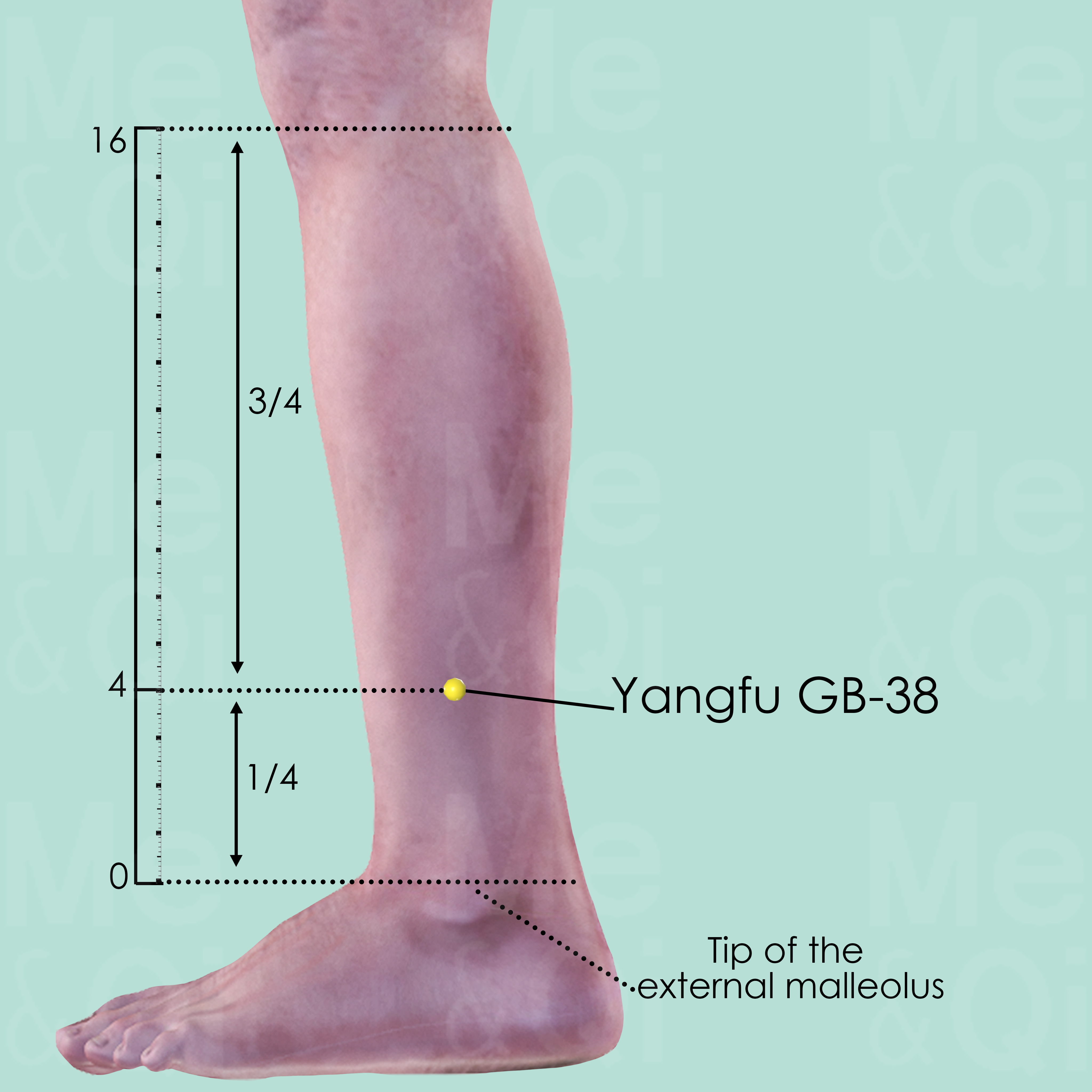
Yangfu GB-38
4 cun above and slightly anterior to the tip of the external malleolus, on the anterior border of the fibula.
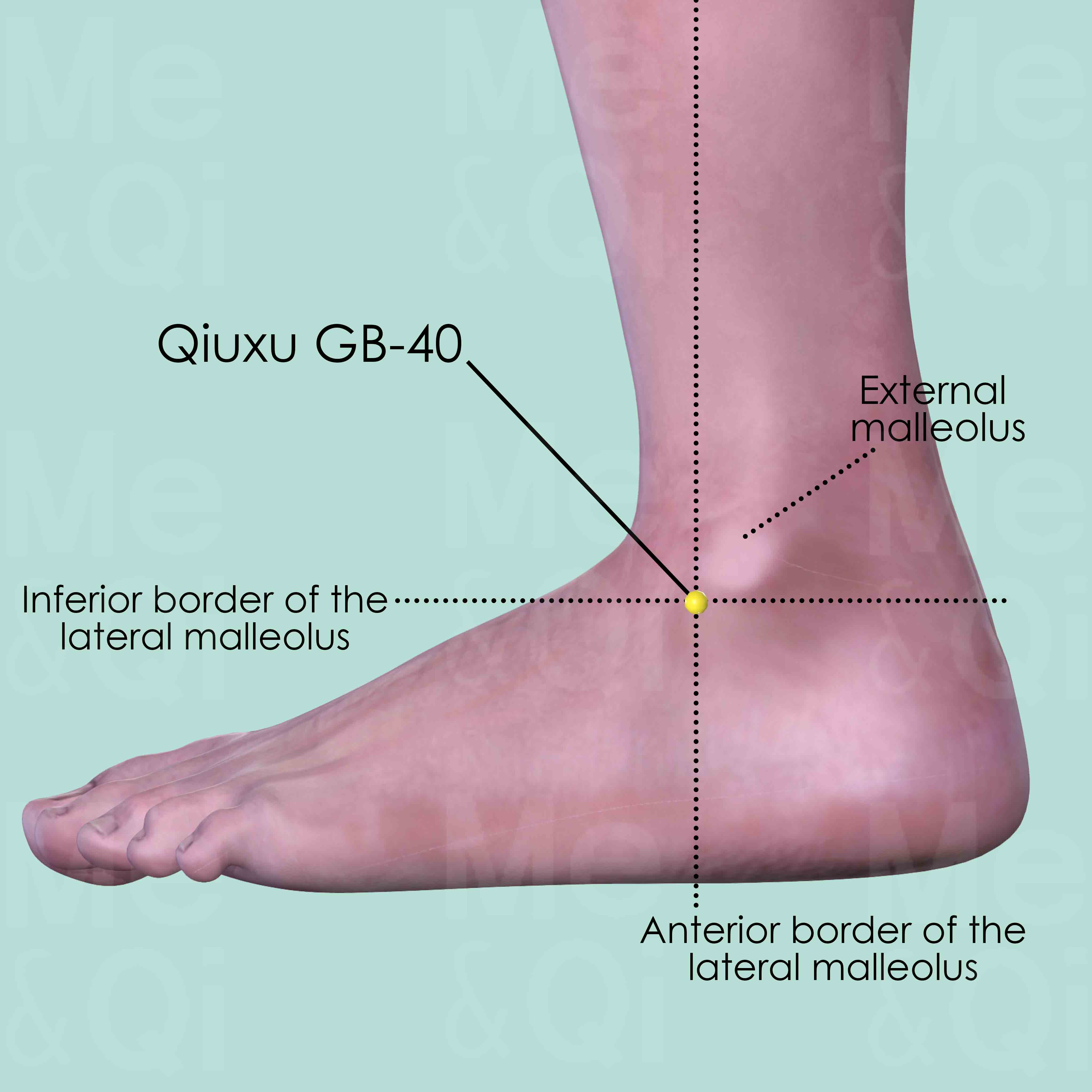
Qiuxu GB-40
Anterior and inferior to the external malleolus, in the depression on the lateral side of the tendon of extensor digitorum longus muscle that goes to the little toe.
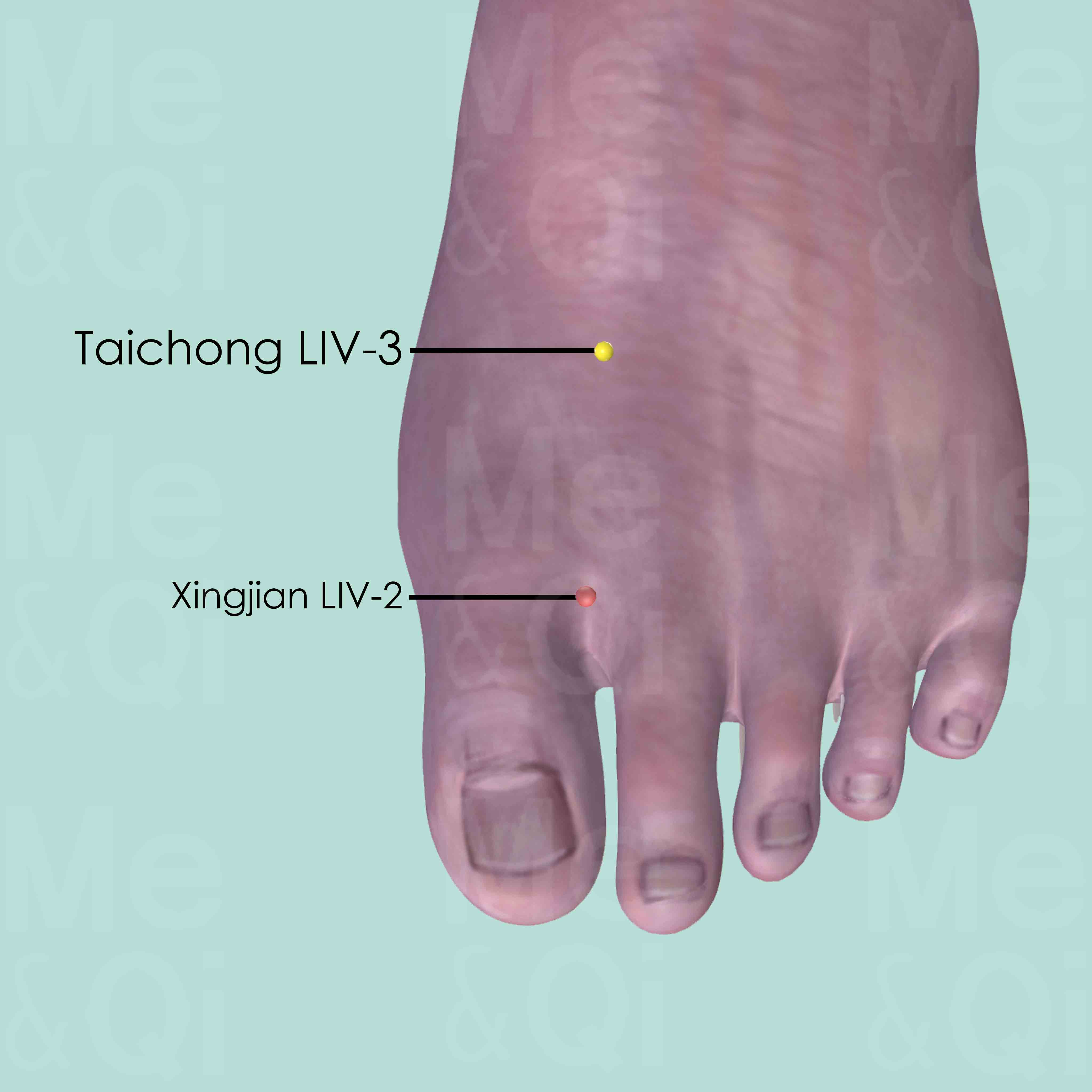
Taichong LIV-3
On the dorsum of the foot, between the 1st and 2nd metatarsal bones, in the depression proximal to the metatarsophalangeal joints and the proximal angle between the two bones.
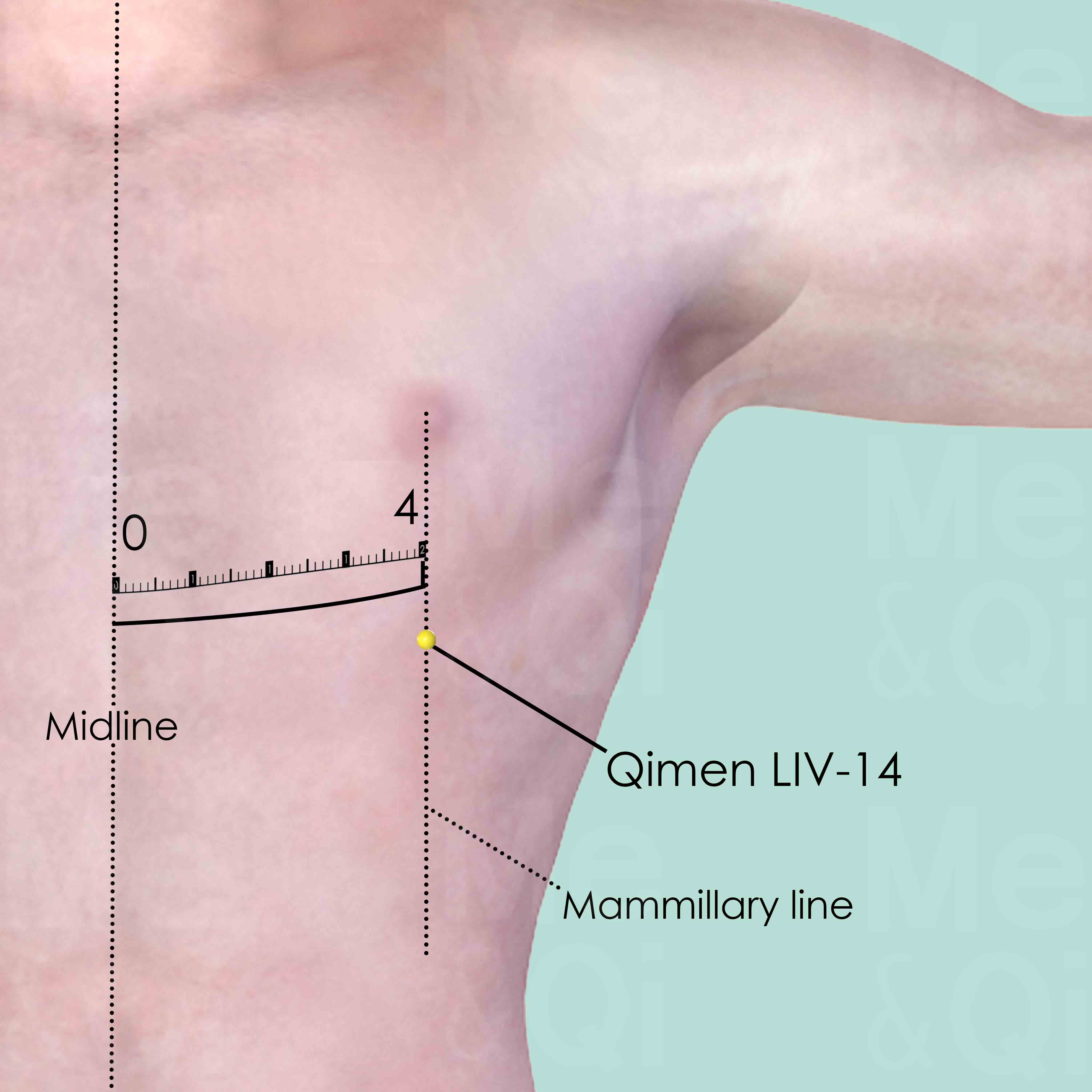
Qimen LIV-14
On the mammillary line, two ribs below the nipple, in the 6th intercostal space, 4 cun lateral to the midline. Please note that there is an alternative location for LIV-14 at the lower edge of the ribcage in line with the nipple or, in women, 4 cun from the midline. In fact, one could look upon these as two separate points. The one in the intercostal space is used more for Channel problems. While the one at the lower edge of the ribcage is used more for Organ problems.
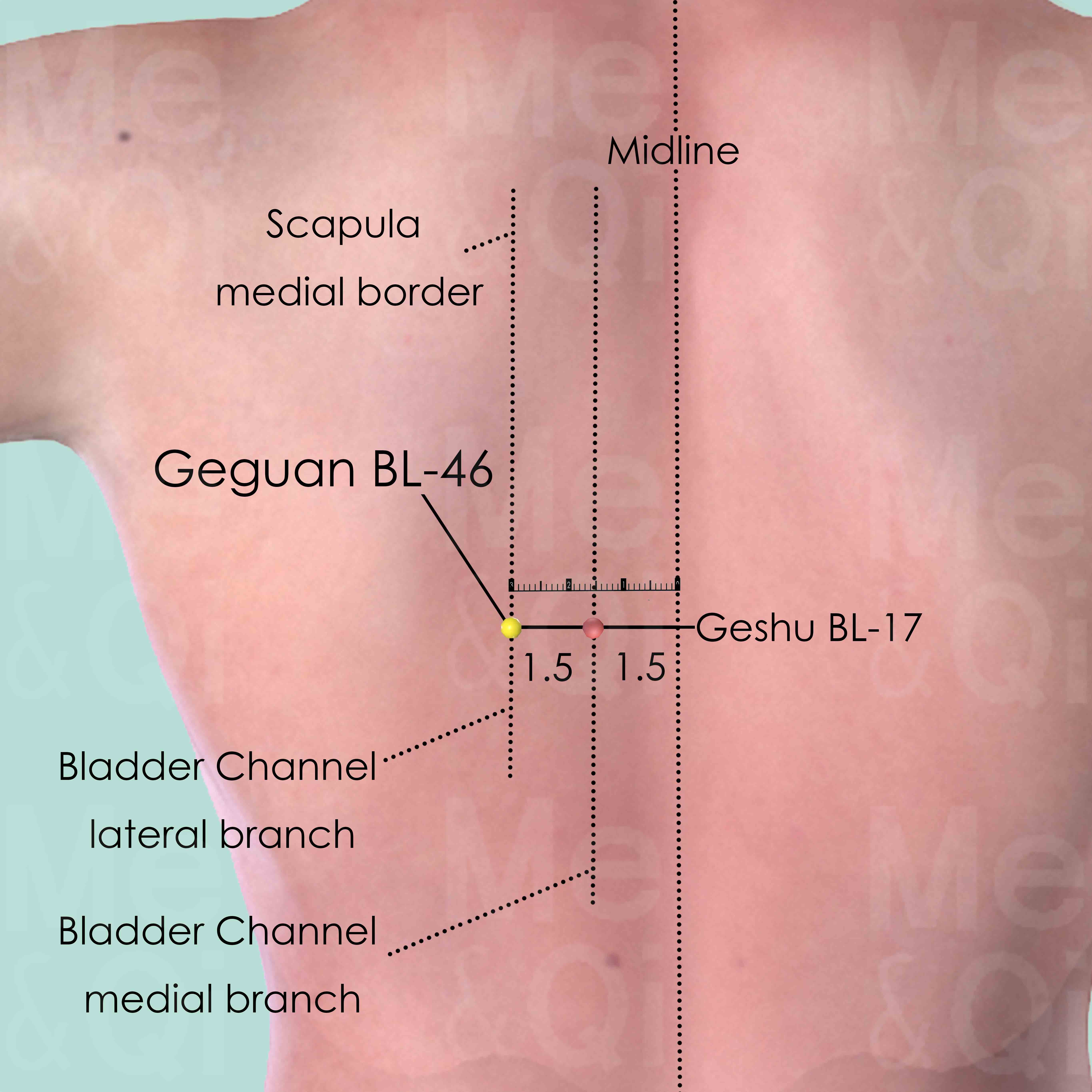
Geguan BL-46
3 cun (about 4 finger-breadths) lateral to the lower border of the spinous process of the 7th thoracic vertebra (T7).
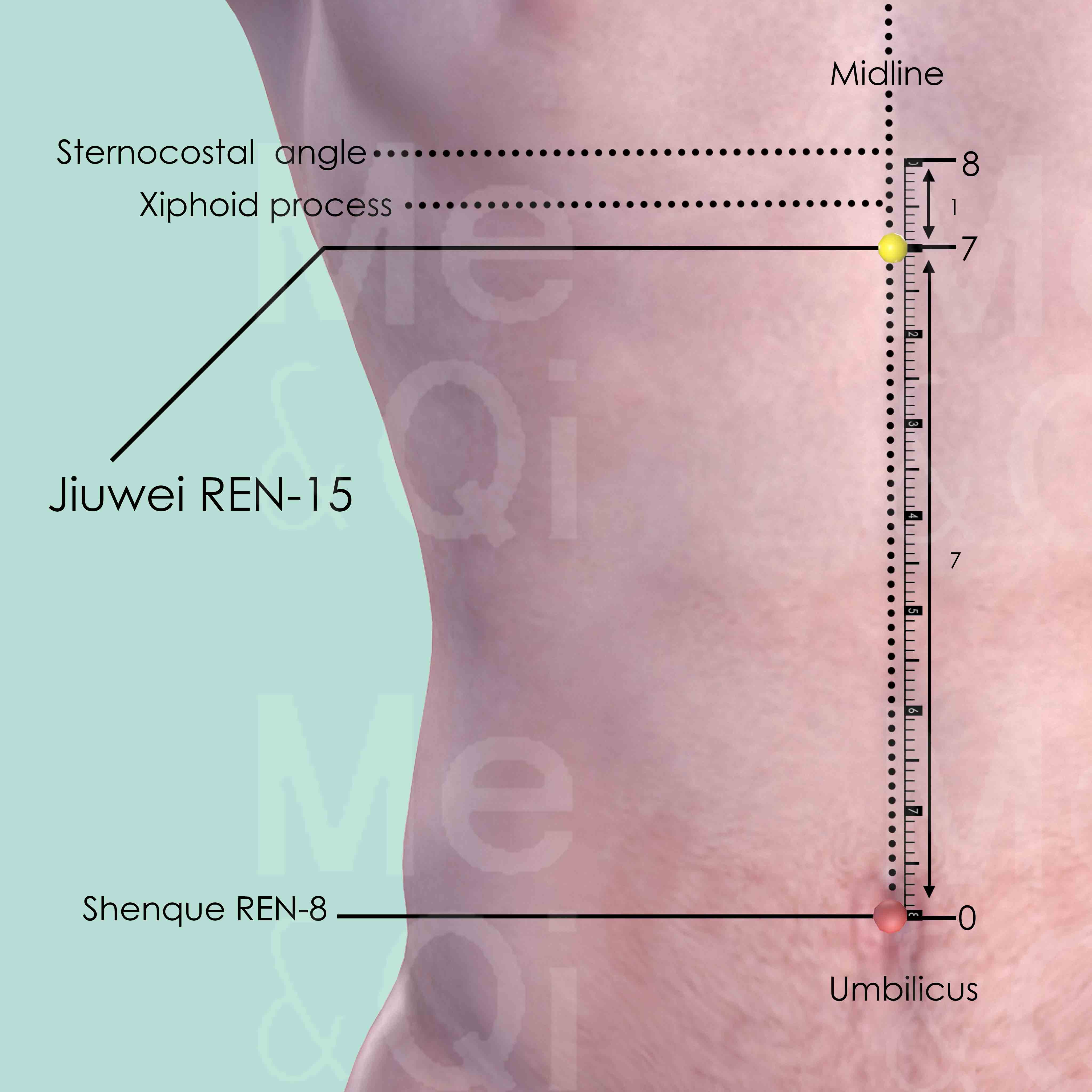
Jiuwei REN-15
On the midline of the abdomen, 7 cun above the umbilicus and 1 cun below the sternocostal angle. This point is located at the tip of the xiphoid process, which is commonly known as ‘dove-tail’ in China, hence the name of the point.
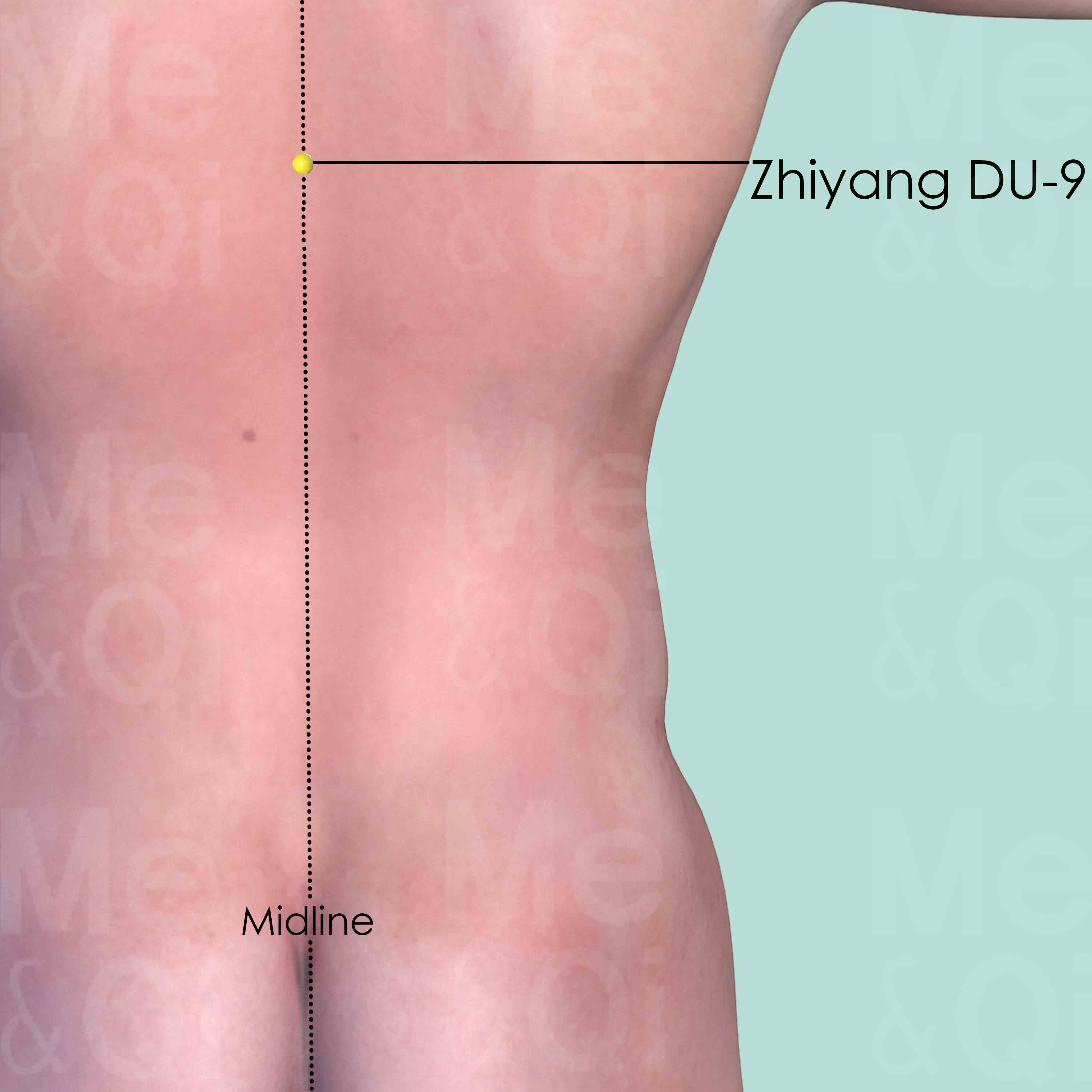
Zhiyang DU-9
On the back midline, in the depression below the spinous process of the 7th thoracic vertebra (T7).

